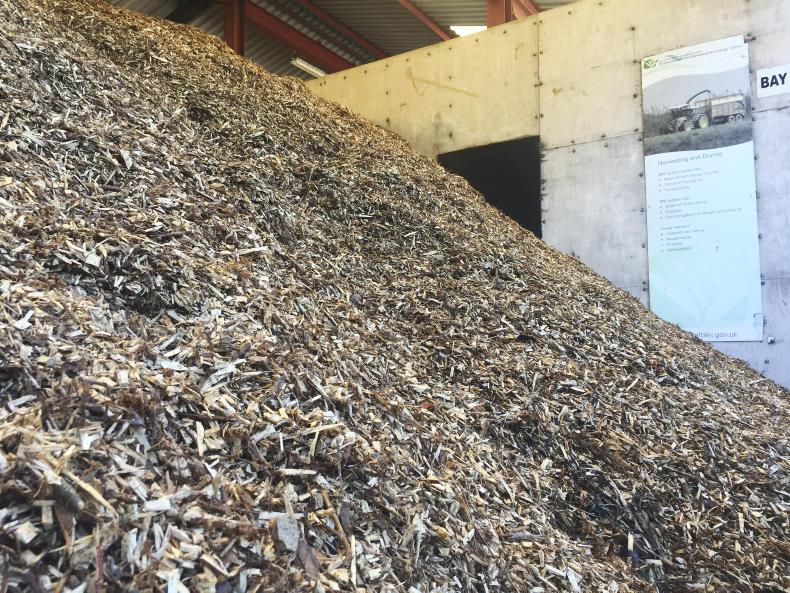Mobilising Irish indigenous biomass and brash is crucial to achieving Ireland’s renewable energy targets in both the electricity and heating sectors, Irish Bioenergy Association (IrBEA) CEO Seán Finan has said.
Speaking in advance of the IrBEA conference sponsored by Bord na Mona, he said Bord na Móna is playing a positive role by helping unlock the biomass opportunity in Ireland as an outlet for residual material which will help decarbonise Ireland's electricity grid.
“The Edenderry power plant is looking to use 100% biomass as a feedstock by 2024, which will maximise locally-sourced biomass. Currently, Bord na Móna is sourcing most of their biomass requirements from Irish suppliers and want to see these Irish volumes grow in the coming years.
“This growth will have the double benefit of developing biomass supply chains for industry and renewable heat and creating new jobs in rural communities,” he said.
Conference
The IrBEA conference, Bioenergy - Inspiring the Industry with Opportunity and Vision, will bring together professionals, industry representatives, researchers, farmers, foresters, technology providers and many important stakeholders across the bioenergy sectors of biomass, biogas, biofuels, energy crops and wood fuels.
The conference will provide a platform to discuss all aspects of the bioenergy industry, its role in the transition to a low-carbon economy and the opportunity and role bioenergy has in addressing climate change. It takes place in Croke Park later this month.
The use of indigenous biomass will assist Ireland to decarbonisation [of] our energy system
“Power using biomass produces a full on-demand renewable energy and complements other renewable technologies,” Finan said.
“When the wind doesn’t blow or the sun doesn’t shine, biomass can guarantee a supply of renewable energy to our electricity grid.
"The use of indigenous biomass will assist Ireland to decarbonisation [of] our energy system, but also drive the economic and growth agenda in rural Ireland.”
IrBEA president Des O’Toole said sustainably produced biomass will play a key role in Ireland’s transition from a fossil fuel-based economy to a low-carbon economy.
“Bord na Móna are actively encouraging the mobilisation of Ireland's private forestry resources, matching local supply with local energy demand, while providing a route to market for these first and second thinnings and brash material,” he said.
Irish forestry
The Irish forestry estate of approximately 750,000ha is currently owned approximately 50% privately and 50% publicly. The private forestry network is owned by approximately 22,000 landowners, of which 83% are farmers. The average size of these forestry holdings is 8.8ha, according to the IrBEA.
Read more
Methane needs to be treated differently – Mitloehner
310hp Magnum chips away in Leitrim
Mobilising Irish indigenous biomass and brash is crucial to achieving Ireland’s renewable energy targets in both the electricity and heating sectors, Irish Bioenergy Association (IrBEA) CEO Seán Finan has said.
Speaking in advance of the IrBEA conference sponsored by Bord na Mona, he said Bord na Móna is playing a positive role by helping unlock the biomass opportunity in Ireland as an outlet for residual material which will help decarbonise Ireland's electricity grid.
“The Edenderry power plant is looking to use 100% biomass as a feedstock by 2024, which will maximise locally-sourced biomass. Currently, Bord na Móna is sourcing most of their biomass requirements from Irish suppliers and want to see these Irish volumes grow in the coming years.
“This growth will have the double benefit of developing biomass supply chains for industry and renewable heat and creating new jobs in rural communities,” he said.
Conference
The IrBEA conference, Bioenergy - Inspiring the Industry with Opportunity and Vision, will bring together professionals, industry representatives, researchers, farmers, foresters, technology providers and many important stakeholders across the bioenergy sectors of biomass, biogas, biofuels, energy crops and wood fuels.
The conference will provide a platform to discuss all aspects of the bioenergy industry, its role in the transition to a low-carbon economy and the opportunity and role bioenergy has in addressing climate change. It takes place in Croke Park later this month.
The use of indigenous biomass will assist Ireland to decarbonisation [of] our energy system
“Power using biomass produces a full on-demand renewable energy and complements other renewable technologies,” Finan said.
“When the wind doesn’t blow or the sun doesn’t shine, biomass can guarantee a supply of renewable energy to our electricity grid.
"The use of indigenous biomass will assist Ireland to decarbonisation [of] our energy system, but also drive the economic and growth agenda in rural Ireland.”
IrBEA president Des O’Toole said sustainably produced biomass will play a key role in Ireland’s transition from a fossil fuel-based economy to a low-carbon economy.
“Bord na Móna are actively encouraging the mobilisation of Ireland's private forestry resources, matching local supply with local energy demand, while providing a route to market for these first and second thinnings and brash material,” he said.
Irish forestry
The Irish forestry estate of approximately 750,000ha is currently owned approximately 50% privately and 50% publicly. The private forestry network is owned by approximately 22,000 landowners, of which 83% are farmers. The average size of these forestry holdings is 8.8ha, according to the IrBEA.
Read more
Methane needs to be treated differently – Mitloehner
310hp Magnum chips away in Leitrim






 This is a subscriber-only article
This is a subscriber-only article











SHARING OPTIONS: